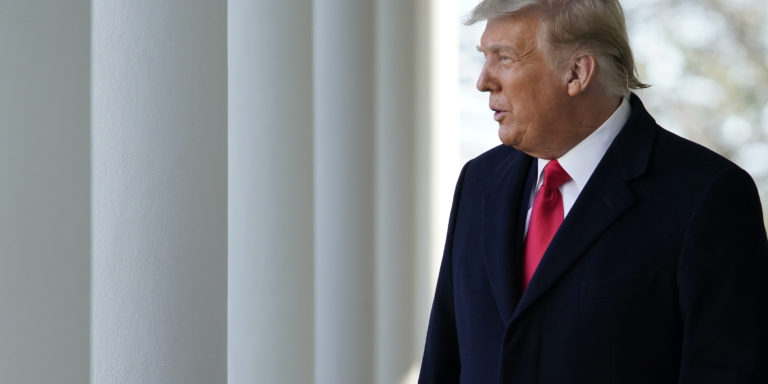INTELBRIEF
January 8, 2021
IntelBrief: Provocateur in Power: Leadership Vacuum Creates Long-term Risks

Bottom Line Up Front
- As a mob stormed Capitol Hill in Washington D.C, this week it appeared that President Trump opted to lead the potpourri of anti-government groups instead of the U.S.
- For inciting insurrection, fueling violence, and creating a leadership vacuum, many argue it is in the national security interest of the country to invoke the 25th Amendment
- Facebook and Twitter acted to limit President Trump’s access to the platforms, intervening when a worried country sought immediate action in managing the situation
- The leadership vacuum may be exploited by external enemies who can see President’s dereliction of duty as an opportunity to strike against U.S. interests.
On January 6, 2021, President Trump cemented a legacy of failed leadership by inciting his supporters to carry out an insurrection designed to stop Congress from fulfilling its constitutionally mandated duty to certify the 2020 Presidential election results. Reports indicate that the Washington DC Attorney General Karl Racine is investigating the President’s role in motivating QAnon, the Proud Boys, Oath Keepers, and a wide array of anti-government and white supremacist groups to storm the Capitol Building. Having urged his supporters to walk down to the Capitol and show strength, he launched a series of messages perceived as an accelerant to the chaos he was observing. In one video, President Trump told his supporters that he ‘loved them’. For refusing to even perfunctorily condemn the violence as it was ongoing and for his reluctance to deploy the national guard at the request of Washington, D.C. Mayor Muriel Bowser and Speaker of the House Nancy Pelosi, there are widespread calls for the Cabinet to invoke the 25th Amendment and remove him from power. Yet, reports indicate that Vice President Mike Pence is opposed to doing so, even though events in the Capitol endangered the democratic process, Congressional staff and government officials, and even his own family. If true, those remaining members of the Trump’s inner circle have also ignored their oath of office to protect the Constitution at the expense of blinding personal loyalty.
Although the 25th Amendment seems unlikely to be invoked, the checks and balances placed against executive power appear to be holding up despite the relentless assault against them. Once the destructive mob was eventually dispersed, the Senate and U.S. House of Representatives carried on with their duties and certified President-elect Biden’s victory by early morning on 7 January. Since Biden’s election victory, President Trump and his allies have put forward unfounded legal cases alleging widespread voter fraud. State and federal courts have unequivocally ruled that there has been no evidence of widespread election fraud and refused to overturn the outcome. Like Congress, the judicial branch of government has withstood President Trump’s withering assault against democracy. In fighting Congress, the courts, and even his own Vice President, President Trump has used social media as a bullhorn to spread conspiracies, disinformation, and fear with an eye towards illegally retaining in power, using tactics familiar to many in authoritarian states. He has failed and it was the private sector which proved most cognizant of the threat and willing to intervene in a timely manner to curtail his destructive influence and remove the President’s last remaining weapon – social media.
Facebook took the step of removing President Trump’s incendiary posts on January 6. Shortly after Facebook’s action, Twitter removed three of President Trump’s most provocative tweets because they violated Twitter’s Civil Integrity Policy, which prohibits users from using Twitter’s services for the purpose of manipulating or interfering in elections or other civic processes, including posting or sharing content that may suppress participation or mislead people. Twitter blocked the President from his Twitter account for 12 hours, pending deletion of the relevant messages, and clarified that he risked a permanent ban. On January 7, Facebook went one step further by indefinitely suspending President Trump’s account. This was not the first collision course between the President and social media giants. In the wake of the riots and insurrection, many of the President’s business allies have also begun to distance themselves from him. As President Trump becomes more isolated and surrounded by only the last of his sycophants, and following his widely reported disinterest in actually undertaking any Presidential duties, the United States is suffering an unparalleled leadership vacuum in the executive branch.
Although only two weeks remain until the inauguration of the Biden-Harris administration, President Trump can still do a lot of damage. He can continue to incite political violence and promote white supremacist groups. If the 25th Amendment is not invoked, Congress should move to impeach him and send a clear signal that those who incite insurrection, terrorism and political violence and violate the very foundations of this democracy will be held accountable. Should he remain in power, and there be any doubt about the severity of his actions, there will be many future risks. In addition to compromising trust and confidence in the democratic process and fueling domestic instability, external adversaries can exploit the chaos and vulnerabilities in the executive branch and inflict grievous harm, though many have already been implicated in widespread disinformation efforts. However, if President Trump is allowed to successfully sow discord, having already compromised security by stalling the transition process and undermining President-elect Biden, he may do more long-term damage to the U. S. than even adversaries like Al-Qaeda and ISIS were able to inflict.